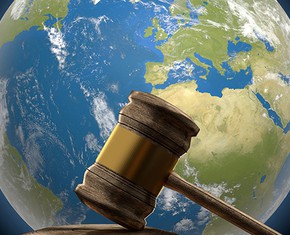The views expressed in our content reflect individual perspectives and do not represent the authoritative views of the Baha'i Faith.
The Baha’i teachings say that God has authored a glorious Book of guidance and inspiration for all humanity, likening each religion to a chapter in that single inimitable book:
Contemplate with thine inward eye the chain of successive Revelations … I testify before God that each one of these Manifestations hath been sent down through the operation of the Divine Will and Purpose, that each hath been the bearer of a specific Message, that each hath been entrusted with a divinely revealed Book and been commissioned to unravel the mysteries of a mighty Tablet. The measure of the Revelation with which every one of them hath been identified had been definitely foreordained.
RELATED: Does Progressive Revelation Include Indigenous Messengers of God?
That passage from Baha’u’llah, the prophet and founder of the Baha’i Faith, summarizes the Baha’i principle of progressive revelation. That powerful principle of the unity of religion defines all Faiths as inherently one — which means that truth is revealed by God progressively over time through a successive series of divine messengers. Baha’is understand that the Creator is one — not Jewish, Christian, Muslim, Baha’i, or any specific religion. God, the Author of all Faiths, transcends every religion, and each religion has a pivotal role and leaves a lasting legacy. Let’s look at the Abrahamic branch of religion, which encompasses Judaism, Christianity, Islam, the Babi Faith, and the Baha’i Faith, to examine those roles.
Abraham
God said to Abraham in Genesis 17:4: “As for me, behold, my covenant is with thee, and thou shalt be a father of many nations.” Genesis 22:17 promises Abraham that God: “… will bless thee, and in multiplying I will multiply thy seed as the stars of the heaven, and as the sand which is upon the sea shore …”
Today, we see worldwide evidence that these prophetic scriptures have been fulfilled.
Indeed, the offspring of Abraham are like the stars of the sky and the sand of the seashores; most of the world’s people follow the teachings of the prophets who descended from Abraham; they are the source of many nations and religions. God kept His promises to Abraham.
Sacred writings from each of those Faiths teach universal principles about treating all people with love and justice:
Leviticus 19:33-34: And if a stranger sojourn with thee in your land, ye shall not vex him. But the stranger that dwelleth with you shall be unto you as one born among you, and thou shalt love him as thyself …
Hebrews 13:1-3: Be not forgetful to entertain strangers: for thereby some have entertained angels unawares. Remember them that are in bonds, as bound with them; and them which suffer adversity, as being yourselves also in the body.
Qur’an, 17:70: We have honoured the Children of Adam and carried them on land and sea, and provided them with good things, and preferred them greatly …
Baha’u’llah: It is not for him to pride himself who loveth his own country, but rather for him who loveth the whole world. The earth is but one country, and mankind its citizens.
If the followers of each Faith obeyed the guidance of the prophets of our respective religions and worked alongside one another despite honest differences of opinion, wouldn’t that go a long way toward establishing world peace?
Moses
Moses’ legacy differs from Abraham’s in some striking ways, yet plays an indisputable role in God’s grand plan. Moses and Abraham’s Jewish Faith share primary principles, including each human being developing virtues, loving God, and keeping His commandments. They differ in secondary principles relative to the needs of their time.
For example, Moses was given the Law of God to exercise and train the people because that is what the Creator determined the creation needed at that time in history. The books of Kings and Judges gives examples of good and evil kings and judges, showing that we have free will to make favorable or unfavorable choices and reap the consequences. As a result, part of the legacy of Judaism was egalitarian ethics and improved human rights.
Jesus Christ
Christ’s revelation varied substantially from Moses and Abraham’s, although it continued to share common primary principles. Christ’s teachings about love and mercy and writing the Law in our hearts seem like a natural progression from the Law of Moses — this is also an example of the Baha’i principle of progressive revelation. Jesus’ revelation complements and continues Moses’ and Abraham’s revelations.
Muhammad
According to “Islam Revealed,” “Jesus is mentioned ninety-seven times in ninety-three verses of the Qur’an. He is called the Spirit of God seven different times.” The Qur’an specifically identifies Jews and Christians as “people of the book” and includes both Faiths in its embrace. The Qur’an says:
Surely those who believe, and those who are Jews, and the Christians, and the Sabians, whoever believes in Allah and the Last day and does good, they shall have their reward from their Lord, and there is no fear for them, nor shall they grieve.
The Bab
The Bab — the forerunner and herald of Baha’u’llah — announced that humanity stood at the threshold of a new era. His mission, which lasted only six years, was to prepare the way for the coming of a messenger of God who would usher in the long-awaited age of peace and justice promised in all the world’s religions.
The title The Bab means “the Gate.” His mission was like that of John the Baptist, who prepared the way for Christ — the Bab prepared the way for Baha’u’llah.
Every prophet who ushers in a new revelation suffers severe persecution. The Babi and Baha’i revelations have experienced severe persecution, and Baha’is still do in some places. During the Bab’s brief ministry, 20,000 believers were cruelly martyred.
RELATED: How to Reinterpret Prophecies with Progressive Revelation
Baha’u’llah
Baha’u’llah, God’s newest messenger, declared his mission during the spring of 1863. His legacy is still unfolding during these formative years. We are now seeing glimpses of Baha’u’llah’s mission — to develop unity among all humanity. Unity, cooperation, consultation, reciprocity and justice will continue to be a hallmark of Baha’u’llah’s revelation.
There is no competition between these prophets of God. They each taught the same basic principles. It would be unseemly for them to disparage or compete against each other. The opposite is true; each of the founders of the great Faiths honors the ones before out of respect and reverence, knowing that the prior messengers created a solid foundation upon which the newer religions could continue to build.
Moses honored Abraham in the Hebrew scriptures. Jesus Christ honored both Moses and Abraham in the Bible. Muhammad and Baha’u’llah also honored and revered Jesus, Moses, and Abraham in their holy books. This teamwork between the spiritual messengers could be likened to a relay, where runners pass the baton consecutively to one another.
In the same way, Baha’u’llah’s teachings exalt all humanity, asking us to unite rather than fight:
O Children of Men! Know ye not why We created you all from the same dust? That no one should exalt himself over the other. Ponder at all times in your hearts how ye were created. Since We have created you all from one same substance it is incumbent on you to be even as one soul, to walk with the same feet, eat with the same mouth and dwell in the same land, that from your inmost being, by your deeds and actions, the signs of oneness and the essence of detachment may be made manifest.
















Comments
Sign in or create an account
Continue with Googleor